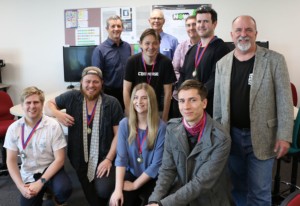
Team Pinecone, 1st row from left Travis, Floyd, Shannon, Kassian and 2nd Simon and Jesse with computing lecturer Thomas Hartley. Back row from left Duncan Barr (NCC), Fred Koenders (Executive Dean, EIT) and Head of School of Business & Computing David Skelton.
This week EIT’s School of Computing celebrated the successful student competitors at GovHack 2019, one of the world’s largest open data competitions.
At the GovHack National Awards on 2 November in Wanganui, Tom’s Misfits (Sarah Griffiths, Anna Brooks, Tara Kearney, Martin Bischofer and Thomas Hartley) took first place for “Best Way to Promote Mental Health”.
EIT Team Pinecone (Shannon Roberts, Kassian Houben, Jesse Gray, Keez Eden, Simon Dolley, Travis Falkenberg and Floyd Watson) finished in second place for both the “Combating Climate Change” and “Innovate NZ” awards.
Team Pinecone was then selected as a finalist for the GovHack International Red Carpet Awards in Canberra on 9 November where they won the highest achievement of the competition, the People’s Choice Award. This award is voted on by participants and judges internationally as the best project of the year.
“It was amazing to see what our teams created with open data in just 46 hours,” said EIT computing lecturer Dr Tom Hartley who brought the hackathon to EIT.
Faculty of Commerce and Technology Dean, Fred Koenders, presented the six winners with a Dean’s Certificate of Excellence. He also acknowledged the councils and government departments that make data available “to improve the world we live in”.
Duncan Barr, Information Services Manager at Napier City Council, one of the event sponsors, highlighted that “The collaboration and teamwork displayed by the teams show the benefits of a strong working relationships between EIT and the local Councils.”
Hawke’s Bay Regional Council ICT Manager Andrew Siddles, another GovHack supporter, said, “This is a great achievement and I’m proud to see a team from this region take out such a prestigious award.”
For Andrew Smith, Chief Information Officer at Hastings District Council, “the winning team from EIT highlights the amazing capability we have in this region and what can be achieved through collaborative councils/EIT partnerships”.
From 6 – 8 September EIT was one of six locations in New Zealand to host GovHack. The teams (86 participants) had a whole weekend to use open government data to find innovative solutions for “problems”, to unlock new social and economic value from open data, or to improve government or community services.
“GovHack has proven to be a great example of the type of extra-curricular and hands-on activity EIT School of Computing students participate in,” said Dr Hartley. “Their achievement is proof that studying at EIT is much more than lectures and labs.”

